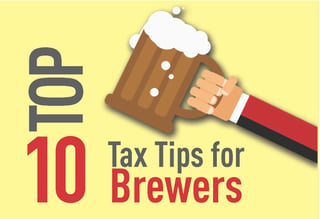 The craft beer industry is booming. And while consumer demand for craft beer is high, that demand alone probably won’t be enough to make or keep your business successful.
The craft beer industry is booming. And while consumer demand for craft beer is high, that demand alone probably won’t be enough to make or keep your business successful.
You need to take all the opportunities available to you to save on expenses. And luckily for brewers, there are many tax opportunities you can qualify for.
Taking advantage of all available tax benefits won’t only save you on taxes. It also may allow you to decrease the amount of costly loans you have to take out and free cash flow for increased reinvestment opportunities.
If you’re in Pennsylvania, the state recently renewed a tax credit especially for brewers. If you’re not in Pennsylvania, read on – most of the tax tips are relevant to people in any state.
A note for startups: While you won’t need tax tips for the early years when you may have net operating losses, you can use those losses for reductions when you do turn a profit.
Now onto our Top 10 Tax Tips for Brewers:
1) Pennsylvania Malt Beverage Tax Credit: The recently renewed state Malt Beverage Tax Credit allows Pennsylvania brewers a credit of up to $200,000 annually on any capital expenditures that expand brewery operations. Brewers can now invest in their facilities and use the credit to offset payment of state excise tax on barrels produced. The credit is effective July 1, 2017 and can be carried forward if it exceeds the current year tax liability.
2) Research and Development Tax Credits: If you’re working on a new beer recipe or product – and which brewer isn’t? – that routine activity could qualify you for the R&D Tax Credit. The credit is intended to promote technological innovation in U.S. companies, which includes improving or developing new products or processes.
The R&D Tax Credit is one of the most lucrative tax benefits available to manufacturers because it’s a dollar-for-dollar reduction in your taxes, unlike many benefits that are only deductions. The credit can be used to pay for wages, supplies and contract services connected to the research. For Pennsylvania brewers, there’s also a state R&D Tax Credit.
3) Domestic Production Activities Deduction: DPAD – for short – applies to manufacturers including breweries. To qualify, a business must pay W-2 wages and be profitable. The deduction amounts to approximately 9% of qualified production activities income. It’s important to separate sales of beer and related merchandise as only activity related to the production of beer can be deducted. For example, if your income from beer production activities in a given year is $100,000, then your DPAD deduction would amount to $9,000. Important Update: The Tax Cuts and Jobs Act eliminated DPAD. Please check out this page for news on Tax Reform changes or contact us at info@concannonmiller.com with questions.
READ MORE: U.S. Manufacturers Should All Be Receiving This Tax Deduction
 4) FICA Tip Credit: Taprooms or brewpubs with tipped employees may qualify for a credit on certain payroll taxes paid on those tips. Essentially, if you have employees that receive wages and tips in excess of the minimum wage, you can recapture a portion of the FICA taxes that were reported and paid. The calculation is somewhat complicated, but if you have tipped employees, there is a good chance you qualify for this credit.
4) FICA Tip Credit: Taprooms or brewpubs with tipped employees may qualify for a credit on certain payroll taxes paid on those tips. Essentially, if you have employees that receive wages and tips in excess of the minimum wage, you can recapture a portion of the FICA taxes that were reported and paid. The calculation is somewhat complicated, but if you have tipped employees, there is a good chance you qualify for this credit.
5) Pennsylvania Sales Tax Exemption on Fixed Assets: Equipment, machinery, parts and supplies used directly in the manufacturing process are exempt from state sales tax. That’s a 6% savings right off the top on qualifying purchases. If you’ve paid sales tax on previous brewing equipment and supplies, it might be worth reviewing your records to see if you could recoup that tax.
6) Work Opportunity Tax Credit: This federal tax credit is available to employers who hire and retain individuals from certain targets groups including veterans, food stamp recipients and the long-term unemployed. The credit can vary depending on the specific target group, wages paid to and hours worked by the individuals. Generally, the credit is equal to 25%-40% of first-year wages paid to the employee.
7) Nexus: If you’re a C Corporation and your state has a high corporate net income tax rate, you could see some significant tax savings by expanding your sales into other states – your blended tax rate may actually be lower. Pennsylvania in particular has a very high corporate net income tax rate – the nation’s second highest at 9.99%.
Each state has their own rules as to when you have to file a tax return in their state, but it may not be all that bad to file in other states because it could lower your overall tax liability. Nexus does not create double taxation. There is an allocation – by state – of the sales, payroll, and fixed assets, so you won’t have double taxation, but as noted, some states, such as Pennsylvania, tax at a very high rate.
READ MORE: 5 Tax Tips Every Beer Brewer Should Consider for Increased Cash Flow
8) Bonus Depreciation: Are you planning to buy any new equipment soon? Then the next two tax tips are especially for you.
Bonus Depreciation allows 50% of the cost of new fixed assets purchased during the years 2016 to 2017 to be written off in the first year that they are placed in service. This is reduced to 40% in 2018 and 30% in 2019. Planning is key for Bonus Depreciation because you may want to purchase equipment, furniture or fixtures in 2016 or 2017 in order to take advantage of the 50% bonus in those years.
9) Section 179 Depreciation: Section 179 is a depreciation method that allows you to accelerate write-offs by immediately deducting the full price of business equipment purchased in a given year. The deduction is available for new and used equipment purchases and is subject to both federal and state limitations. The deduction is particularly effective in years when you turn a profit as the deduction is limited to your business income annually.
For example, if you purchase a fermenter for $25,000 it would typically be depreciated over a 5-year period. Using Section 179 Depreciation, you can immediately expense the entire $25,000 on both your federal and state tax returns in the current year. Important Update: The Tax Cuts and Jobs Act greatly enhanced equipment depreciation options. Check out this article for the new limits or contact us at info@concannonmiller.com with questions.
10) Cost Segregation Study: If you own the real estate where your brewery or brew pub is located, this is a tip you should strongly consider. Normally, commercial buildings are depreciated over a 39‐year period; however, components of the building may be able to be depreciated over a much shorter period of time. For example, the building’s electrical system that runs your business equipment can be depreciated over a 7‐year period, instead of over 39 years.
It is common practice to have a cost segregation study performed by qualified professionals to break out the building into much shorter life elements, or personal property, which would be depreciated over 5 or 7 years. An analysis would have to be done to determine whether the expense of a cost segregation study would be less than the tax savings, but in many cases, the cost pays for itself with the tax savings generated from the increased depreciation.
Contact at adesiderio@concannonmiller.com, dhozza@concannonmiller.com or 610-433-5501 to see which of these tax benefits your brewery qualifies for. Also, follow us on Twitter at @BrewersCPA.





